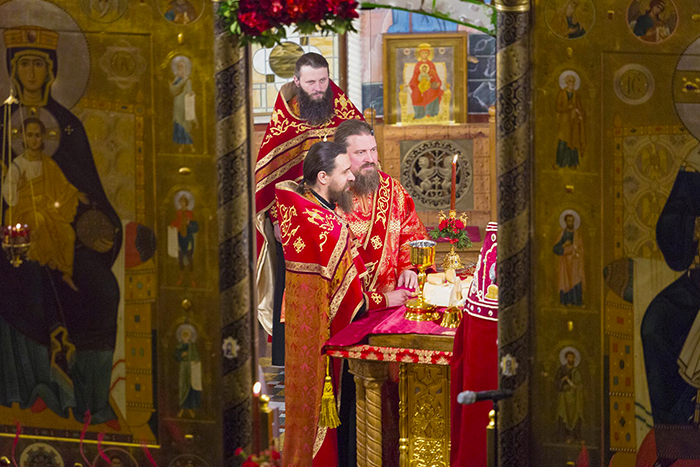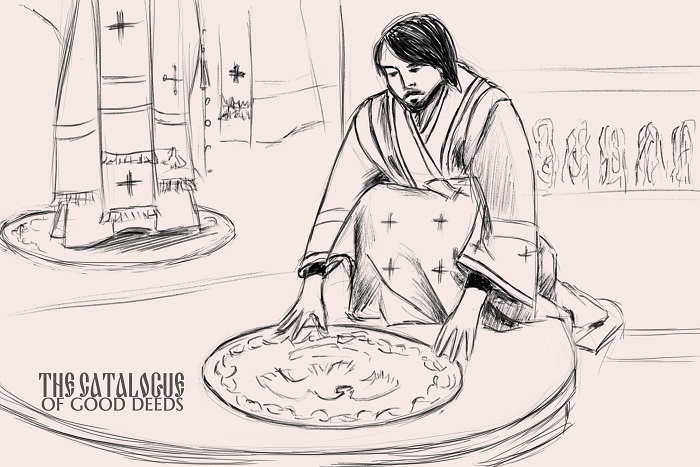
It has been a longstanding challenge for the congregation to consciously participate in the divine service. A possible reason for the fact that worshipers have difficulty comprehending the Liturgy is due to the secret reading of Eucharistic prayers. When and why did this custom come into being? To what extent does this tradition meet contemporary pastoral needs?
Ancient Accounts
There was no “secret” reading of Eucharistic prayers in the ancient Church. Believers gathered in small rooms and celebrated the Eucharist together, “breaking bread from house to house, did eat their meat with gladness and singleness of heart” (Acts 2:46). There is ample evidence of such universal and public prayer. St Justin Martyr († 165) writes that the leader thanks God in detail for all His blessings, after which the faithful seal his prayer with the word “amen” (Apology I). St. Dionysius of Alexandria († 265), when discussing how to re-admit a fallen Christian into the Church, considered it unacceptable to re-baptize someone who “listened to thanksgiving and said ‘amen’ with others”. (Eusebius, Church History, Book 7, Ch. 9). One of the manuscripts even reported a practice of uttering the anaphora by the people: “Then they recite the Eucharistic prayer, following the leading bishop” (Ludolph’s Alexandrian Scroll). The vocal reading was testified in the fourth century by St. John Chrysostom († 407): “The prayers of thanksgiving are also common, for it is not just the priest who offers thanksgiving, but the whole people; for first he receives the answer from the people and the consent of the people that what he is doing is worthy and righteous, and then the priest commences thanksgiving” (Conversation 18 on 2 Corinthians). Vocal reading of prayers is common in the early Church. What are the reasons for the change in apostolic practice?
The Unholy Saints
One of the main reasons that prompted the hierarchy to abandon the loud reading of the Anaphora was the decrease of piety in the majority of the faithful, due to the mass influx of nominal Christians during the Christianization of the Roman Empire. The famous liturgist Archimandrite Cyprian (Kern), citing the prominent pre-revolutionary theologian Prof. Alexander Golubtsov, writes that “the indifference of the people to the church life led to the practice of reading prayers in secret, and this not only failed to strengthen the Eucharistic consciousness, but even weakened it and almost destroyed it” (The Eucharist). According to Prof. Golubtsov, the ancient disciplina arcani, which had previously been applied only to the outsiders and the catechumens, came to be extended to the baptized Christians who did not go to church regularly. They began to be considered not as “the royal priesthood, the holy people” (1 Peter 2:9), but as the people of this age, Christians on demand. The clergy began to consider themselves the guardians of what was happening in the altar from the “uninitiated” laymen, who were unworthy to hear the prayers of the invocation. This was facilitated by the laymen giving up on regular and frequent communion of the Holy Gifts. The Liturgy went from the Common Cause of the entire Church community to the Frightful Sacrament, which should be watched and not necessarily taken of. The liturgical prayers urging the people to partake of the Sacrament became the property of those who observe the ancient norm of frequent communion, i. e. the clergy, so they were considered not obligatory for the believers. As a result, common prayers were gradually becoming secret by the 6th century. Blessed John Moschus († 622) denounces the practice of vocal reading, citing an example of children who heard the words of the Liturgy and then used them for play (Spiritual Meadow, Ch. 196). St. Germanus of Constantinople († 730) writes that “secret prayers” are a well-established standard: the priest “opens his mouth before God and, talking to Him alone… secretly proclaims secrets before God” (Consecutive Presentation of Church Services and Rites).
Recovery Attempts
The Emperor Justinian published his 137th Novella in 565: “We command that all bishops and elders should not secretly offer Divine offerings and prayers at Holy Baptism, but with a voice that would be well heard by a faithful people, so that the souls of those who hear might be led to greater reverence, praise, and blessing.” He was not able to reverse the situation, though, and subsequent sources speak of secret prayers as a matter of fact. The lay people of Constantinople were still interested in the content of priestly prayers in the eleventh century, “Some of those standing outside the altar often get bewildered, arguing among themselves and saying: what is the purpose, idea and power of the silent prayers, and want to find out about that” (Protheoria, a Byzantine liturgical commentary). The Athos compilers of Philokalia advocated the renewal of vocal reading of secret prayers in Greece in the 18th century; the issue was actively discussed in Russia by the Fathers of the 1917 Council.
The secret reading of prayers was caused by both historical and pastoral reasons. The hierarchy tried to teach the lay people to respect the Liturgy in order to avoid its defamation. This decision had both positive (awe of the lay people) and negative (their inability to participate in the main prayer of the Liturgy) effects. At this time of the Eucharistic revival, with the universal availability of liturgical texts, the situation is changing and it becomes not only possible, but also pastorally reasonable to read the prayers out loud. To this end, not only liturgists and pastors of the Church but also the Liturgy itself call for the praise of God “with one voice and one heart” and for all to “hearken to the holy offering” together.



